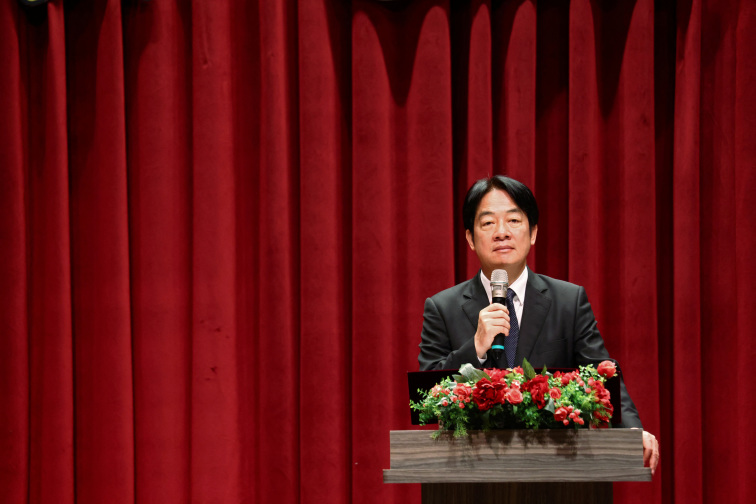Taiwanese anti-CCP influencer Bajiong (right) visits Chen Boyuan (left). (Video screenshot)
[People News] Taiwanese anti-CCP influencer Bajiong recently released a documentary titled "China's United Front," shedding light on how the Chinese Communist Party (CCP) entices and co-opts Taiwanese influencers for its propaganda and influence operations. The documentary has sparked widespread attention and debate in Taiwan.
The film features Taiwanese rapper Chen Boyuan, who was once a "model influencer" for the CCP’s United Front. In the documentary, Chen reveals how the CCP's United Front Work Department recruits Taiwanese influencers, naming several influencers who have collaborated with the department. Despite endorsing the CCP, these influencers admit that earning money in mainland China is less profitable than in Taiwan.
Documentary Reveals CCP's Tactics and Chen Boyuan's Break with Beijing
Bajiong, the host of the Fun TV YouTube channel with over 1.02 million subscribers, focuses on CCP politics and Chinese current events. On December 6, he released China's United Front: Part One, featuring Chen Boyuan, who detailed how the CCP co-opts Taiwanese influencers.
In the documentary, Chen Boyuan shared his experiences, including partnering with the son of the chairman of Jinjiang City’s Taiwan Affairs Association to start a business, only to be defrauded. Additionally, his song Chinese CEO, which amassed over 1 billion views in mainland China, failed to generate any royalties for him.
Faced with numerous setbacks, Chen Boyuan transitioned from endorsing the CCP to severing ties and exposing its misconduct.
(*Full video of China's United Front: Part One) https://www.youtube.com/watch?v=IXndeTRH8tU&t=12s
The documentary includes a phone conversation between Chen Boyuan and influencer “Maigo886,” who had previously accompanied Chiang Yo-ching, grandson of former Taiwanese President Chiang Ching-kuo, to Ningbo, Fenghua, for an “ancestral roots” visit. In the call, Maigo886 disclosed that Taiwanese influencers like “Han Guoren” and “6yi7” had cooperated with the CCP’s Taiwan Affairs Office. However, he admitted that endorsing the CCP brings little financial gain for Taiwanese influencers today, as Chinese audiences largely ignore them, dismissing their efforts as mere attention-seeking.
Chen Boyuan also recounted a conversation with the editor-in-chief of the CCP’s Fujian-based Straits Herald. Pretending to advocate for Taiwanese youth to develop careers in China, he was told that arrangements and resources could be provided. During negotiations for United Front collaboration, the editor casually mentioned contacting influencer Zhong Mingxuan. In response, Zhong Mingxuan posted on Threads, stating, “As the (unpaid) cultural ambassador shared between the two sides of the Taiwan Strait, my travel videos are entirely self-funded, despite how high-profile the title sounds.”
Chen Boyuan revealed in the film that CCP United Front agencies provide influencers with extensive materials, some featuring Taiwanese political figures like Hung Hsiu-chu and Hou You-yi. The agencies encouraged him to produce anti-DPP (Democratic Progressive Party) songs such as Bomb Taiwan to influence Taiwanese politics.
In an updated video on Saturday, December 7, Chen Boyuan disclosed that since the release of the documentary, his Weibo inbox had been inundated with insults from Chinese nationalists, calling him a "Taiwan independence dog" and threatening violence, such as “Come to Fujian, and I’ll serve you my fists.” His Douyin account, “Min Nan Wolf PYC,” was also deleted by platform authorities.
Former Taiwanese Legislator: Investigate CCP's "United Front Agents" in Taiwan
The release of Bajiong’s China’s United Front: Part One has sparked widespread attention in Taiwan. As of this writing, the documentary has garnered over 1.43 million views and 72,000 likes.
Former Taiwanese legislator Chen Po-wei commented on Facebook, stating, "Some may find the highlight of the film to be the unintentional mention of certain influencer names, but behind the names that have been revealed, there are undoubtedly many more that remain hidden." He emphasized the importance of understanding the operational system of the CCP's United Front tactics, as familiarity with these methods makes them easier to identify in the future.
Chen Po-wei pointed out that the most cautionary aspect of Bajiong’s documentary is that despite endorsing the CCP, these Taiwanese influencers earn less money in mainland China than they do in Taiwan.
Ho Cheng-hui, deputy secretary-general of the Taiwan Security Association, highlighted in an interview that one of the CCP's primary methods for recruiting Taiwanese influencers is "traffic redirection." This approach doesn’t even require influencers to travel to China, as the CCP can manipulate online traffic to achieve "cross-strait recruitment" and "cross-strait United Front operations."
Taiwanese legislator Shen Bo-yang argued that tracing the CCP's monetary flows is only secondary. The primary focus should be exposing the intermediaries, including travel agencies, gangs, professors, businessmen, and even legislators and council members who act as "United Front agents." He stressed the importance of bringing these individuals into the light.
Yaita Akio: Documentary Highlights Four Key Points
Yaita Akio, former Taipei bureau chief of Sankei Shimbun, shared his thoughts on Facebook. He noted that many viewers found Bajiong’s new documentary both inspiring and shocking, as it revealed multiple layers of the CCP’s United Front operations against Taiwan. While some of the content has been reported in the past, this film provides detailed insights through specific conversations and examples.
Yaita outlined four major takeaways from the documentary: first, Reduced Funding for United Front Activities. Yaita observed that the CCP’s funding for its Taiwan-related departments has significantly decreased compared to previous years. Whereas the CCP once paid generously to co-opt Taiwanese influencers, it now negotiates and haggles over costs. This shift indicates a significant reduction in the benefits these influencers can gain from betraying Taiwan.
Secondly, Yaita Akio believes that the documentary’s mention of several influencers frequently shifting their stances highlights the breadth and complexity of United Front tactics. Notably, overseas Chinese schools were identified as being directly under the CCP’s United Front Work Department. Every year, hundreds of Taiwanese students graduate from these schools, posing a potential direct impact on Taiwanese society. "The continuous influx of these graduates into Taiwan’s society is deeply concerning," he said.
Additionally, Yaita Akio pointed out that the documentary emphasizes the risks faced by Taiwanese businesspeople (Tai-shang) when cooperating with China. He highlighted numerous cases of exploitation, where Taiwanese entrepreneurs not only risk having their assets forcibly seized but even face threats to their lives. He urged Taiwanese businesspeople to fully understand these potential dangers when doing business in China.
Yaita warned that the CCP’s primary targets for attacks and defamation are Taiwan’s social system and the ruling Democratic Progressive Party (DPP) government, with the intent of undermining Taiwan’s political environment. The CCP’s manipulation of Taiwanese influencers is designed to create division and confusion, leading many to betray their homeland, family, and friends for minimal personal gain. This is something that everyone should remain vigilant about.
Finally, Yaita stated that Bajiong’s documentary is highly valuable as it helps people understand the immense challenges Taiwan faces. He expressed his sentiment, saying, "Taiwanese society and the ruling party must not only guard against infiltration from across the strait but also go beyond mere defense and devise proactive countermeasures."
(Dajiyuan reporter Li Jing contributed to this report.)











News magazine bootstrap themes!
I like this themes, fast loading and look profesional
Thank you Carlos!
You're welcome!
Please support me with give positive rating!
Yes Sure!